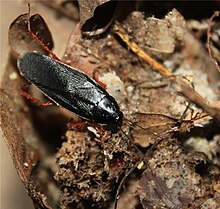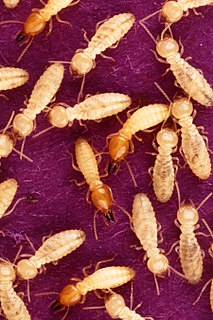
Termites are eusocial insects that are classified at the taxonomic rank of infraorder Isoptera, or as epifamily Termitoidae within the order Blattodea. Termites were once classified in a separate order from cockroaches, but recent phylogenetic studies indicate that they are related to cockroaches, as they are the sister group to wood eating cockroaches of the genus Cryptocercus. Previous estimates suggested the divergence took place during the Jurassic or Triassic. More recent estimates suggest they have an origin during the Late Jurassic, with the first fossil records in the Early Cretaceous. About 3,106 species are currently described, with a few hundred more left to be described. Although these insects are often called "white ants", they are not ants, and are not closely related to ants.

Bookworm is a general name for any insect that is said to bore through books.

The Florida woods cockroach or palmetto bug is a large cockroach species which typically grows to a length of 30–40 mm (1.2–1.6 in). When alarmed, adults can eject an extremely foul-smelling directional spray up to 1 m, which inspired several of its other common names: Florida skunk roach, Florida stinkroach, skunk cockroach, skunk roach, stinking cockroach, and stinkroach. Two other naming variations include Florida cockroach and Florida woods roach.

The oriental cockroach, also known as the waterbug or black beetle, is a large species of cockroach, adult males being 18–29 mm (0.71–1.14 in) and adult females being 20–27 mm (0.79–1.06 in). It is dark brown or black in color and has a glossy body. The female has a somewhat different appearance from the male, appearing to be wingless at a casual glance, but is brachypterous, having non-functional wings just below her head. She has a wider body than the male. The male has long wings, which cover three quarters of the abdomen and are brown in color, and has a narrower body. Both of them are flightless. The female oriental cockroach looks somewhat similar to the Florida woods cockroach and may be mistaken for it. Originally endemic to the Crimean Peninsula and the region around the Black Sea and the Caspian Sea, its distribution is now cosmopolitan.

Ectobiidae is a family of the order Blattodea (cockroaches). This family contains many of the smaller common household pest cockroaches, among others. They are sometimes called wood cockroaches. A few notable species include:

Cryptocercus is a genus of Dictyoptera and the sole member of its own family Cryptocercidae. Species are known as wood roaches or brown-hooded cockroaches. These roaches are subsocial, their young requiring considerable parental interaction. They also share wood-digesting gut bacteria types with wood-eating termites, and are therefore seen as evidence of a close genetic relationship, that termites are essentially evolved from social cockroaches.

The Pennsylvania wood cockroach or Pennsylvanian cockroach is a common species of cockroach in eastern and central North America.

Parcoblatta virginica, the Virginia wood cockroach, is a small cockroach species of the genus Parcoblatta, measuring about a centimeter long as an adult.

Parcoblatta fulvescens, the fulvous wood cockroach, is a species of cockroach endemic to the United States and possibly Canada that measures around 13 mm (0.5 in) long.
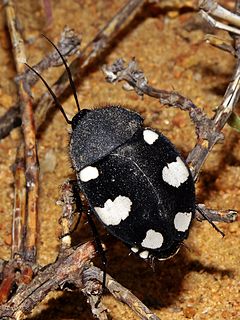
Blattodea is an order of insects that contains cockroaches and termites. Formerly, the termites were considered a separate order, Isoptera, but genetic and molecular evidence suggests an intimate relationship with the cockroaches, both cockroaches and termites having evolved from a common ancestor. The Blattodea and the mantises are now all considered part of the superorder Dictyoptera. Blattodea includes approximately 4,400 species of cockroach in almost 500 genera, and about 3,000 species of termite in around 300 genera.

Cockroaches are insects of the order Blattodea, which also includes termites. About 30 cockroach species out of 4,600 are associated with human habitats. Some species are well-known as pests.

The Dubia roach, also known as the orange-spotted roach, Guyana spotted roach, or Argentinian wood roach, is a medium-sized species of cockroach which grows to around 40–45 mm (1.6–1.8 in).

Drymaplaneta semivitta is a species of cockroach native to Australia and introduced to New Zealand. In New Zealand, it is known as the Gisborne cockroach, after the city of Gisborne where it was first discovered in the country.
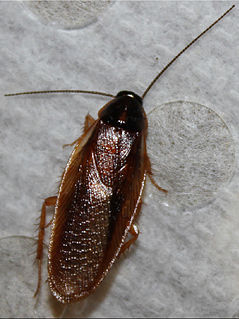
Parcoblatta bolliana, Boll's wood cockroach or Boll's wood roach, is a small species of wood cockroach native to the United States, measuring around 11 mm (0.43 in) long.

Parcoblatta lata, the broad wood cockroach, is a species of wood cockroach native to the United States. It is one of the largest species of wood cockroaches.
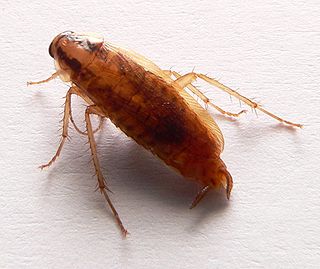
Blattellinae is a subfamily of the cockroach family Ectobiidae. It includes the global household pest Blattella germanica, the German cockroach, but also a number of species that are known to be endangered. It contains about 70 genera.

Ischnoptera bilunata is a species of cockroach in the family Ectobiidae. It is found in North America and South America.

Ischnoptera is a genus of cockroach in the family Ectobiidae.
